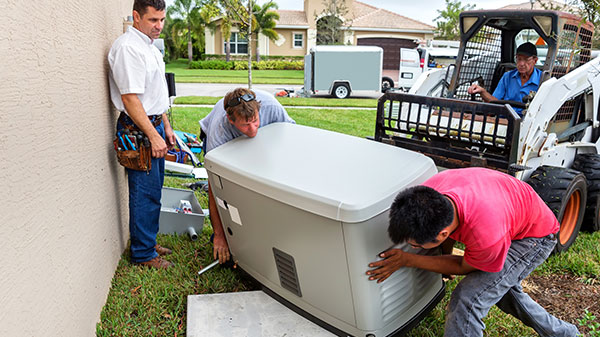
Installing a permanent generator can help serve power needs in an emergency. Portable units are also available.
Does your emergency preparedness plan include a generator? Whether you’re facing a public safety power shutoff in California due to red flag wildfire conditions or an ice storm, heavy snow or hurricane that downed power lines or another manmade or environmental emergency, it’s a good idea to be ready for power outages. Outages can last for days or weeks depending on the unique circumstances of the emergency, leaving you without the ability to conduct normal, everyday actions.
OUTAGES NOT UNCOMMON
According to the U.S. Energy Administration, power outage durations for U.S. electricity customers averaged 5.8 hours per customer in 2018. However, we often don’t consider the consequences of a power outage until we personally experience one.
Extended periods without power can lead to:
- spoiled food
- the inability to run medical equipment
- frozen pipes and property damage
- inactive security systems
INTERNET ACCESS AFFECTED
Lack of power could also mean the lack of internet access. With more people than ever working at home and many students participating in remote or hybrid learning, an outage could leave you unable to conduct everyday work or school activities. Internet access is also key to many smart home technologies.
To keep the lights on during the next emergency, consider purchasing a generator to enhance your property’s protection.
PORTABLE OR PERMANENT?
Generators come in two basic types – portable or permanent – of various sizes and wattages that can be tailored to your specific needs:
- Are outages frequent or rare in your area?
- Do you need all power in the home to be available during an outage or just enough for critical systems?
Whatever your specific situation, having a backup source of power will help to make sure you are not in the dark during the next emergency.
GENERATOR SAFETY
Whichever type of generator you choose, consider these tips for safe operation:
- Use generators outside only, away from your home and away from windows. Never run a generator inside a home or garage because of the risk of carbon monoxide poisoning.
- Make sure your generator is properly grounded.
- Disconnect the normal source of power coming into your home before operating the generator.
- Never plug the generator into a wall outlet.
- Keep the generator dry. In flood prone areas, elevate the generator above ground to prevent it from being inoperable during times of rising water.
- Maintain an adequate supply of fuel. Know how much fuel your generator consumes at various power outlet levels and plan to have enough fuel on hand to meet your needs. Keep fresh fuel in the tank.
- Maintain your generator regularly by scheduling one service call per year.
- Run the generator periodically to ensure it is in working order.
MORE INFORMATION
Using a generator when returning from evacuation: https://www.ready.gov/evacuation
Power outages: https://www.ready.gov/power-outages
Generator safety: https://www.nfpa.org/-/media/Files/Public-Education/Resources/Safety-tip-sheets/GeneratorSafetyTips.ashx
This loss control information is advisory only. The author assumes no responsibility for management or control of loss control activities. Not all exposures are identified in this article. Contact your local, independent insurance agent for coverage advice and policy service.
